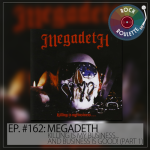
Episode 162 takes us back to the birth of Megadeth! The wheel picked their ferocious debut Killing Is My Business… And Business Is Good! — a raw, fast, and furious start to one of metal’s greatest legacies.
Killing Is My Business… and Business Is Good! is the debut studio album by American thrash metal band Megadeth, released in the UK on May 17, 1985, by Music for Nations and in the US on June 12, 1985, by Combat Records.
At the beginning of 1985, the band was given $8,000 by Combat to record and produce its debut album. The band was forced to fire their original producer and produce the album by themselves, after spending half of the album’s budget on drugs, alcohol, and food. Despite the poor production, the album was a well-received effort that obtained strong reviews in various music publications. Killing Is My Business… and Business Is Good! played an essential role in establishing thrash metal as an authentic subgenre of heavy metal music. It explores themes of death, occultism, and violence.
The album features the track “Mechanix”, a song that frontman Dave Mustaine would perform with Metallica during his tenure in the band, and a controversial cover of the 1965 song “These Boots Are Made for Walkin'”. All songs from the album were performed frequently during Megadeth’s initial tour but have been steadily dropped from the setlist since, except for “Mechanix”.
Originally, Dave Mustaine was the lead guitarist for Metallica. However, due to drinking, substance abuse, violent behavior, and personality conflicts with bandmates James Hetfield and Lars Ulrich, Mustaine was eventually fired from the band. Two months after being fired from Metallica, Mustaine met bassist David Ellefson and together they formed Megadeth in Los Angeles. Mustaine later recalled: “After getting fired from Metallica, all I remember is that I wanted blood. Theirs. I wanted to be faster and heavier than them.” Fueled by the desire for revenge, Mustaine elevated the intensity of Megadeth’s music in order to challenge his former band. He sped up existing songs such as “Mechanix”, which Metallica’s new line-up adapted into the slower paced “The Four Horsemen”. Mustaine included his original version of the song on the album to “straighten Metallica up”, as Metallica referred to Mustaine as a drunk, and said that he could not play guitar.
Megadeth
Dave Mustaine – lead vocals, guitar, piano on “Last Rites/Loved to Death”
David Ellefson – bass guitar, backing vocals
Chris Poland – guitar
Gar Samuelson – drums, timpani on “Rattlehead”
Production
Dave Mustaine and Karat Faye – Production & Mixing
Megadeth – Co-production
Jay Jones – Pre-production
Intro Music/Wheel Spin Music by LiteSaturation from Pixabay

Fair Use
* Copyright Disclaimer Under Section 107 of the Copyright Act 1976, allowance is made for "fair use" for purposes such as criticism, comment, news reporting, teaching, scholarship, and research. Fair use is a use permitted by copyright statute that might otherwise be infringing. Non-profit, educational, or personal use tips the balance in favor of fair use. No copyright infringement intended. ALL RIGHTS BELONG TO THEIR RESPECTIVE OWNERS
This is our musical reaction, breakdown, and commentary analysis of the song. We intend no copyright infringement, and this is not a replacement for listening to the artist's music. The content made available through this site is for educational and informational purposes only.
The site may contain copyrighted material owned by a third party, the use of which has not always been specifically authorized by the copyright owner. Notwithstanding a copyright owner’s rights under the Copyright Act, Section 107 of the Copyright Act allows limited use of copyrighted material without requiring permission from the rights holders, for purposes such as education, criticism, comment, news reporting, teaching, scholarship, and research. These so-called “fair uses” are permitted even if the use of the work would otherwise be infringing. *





